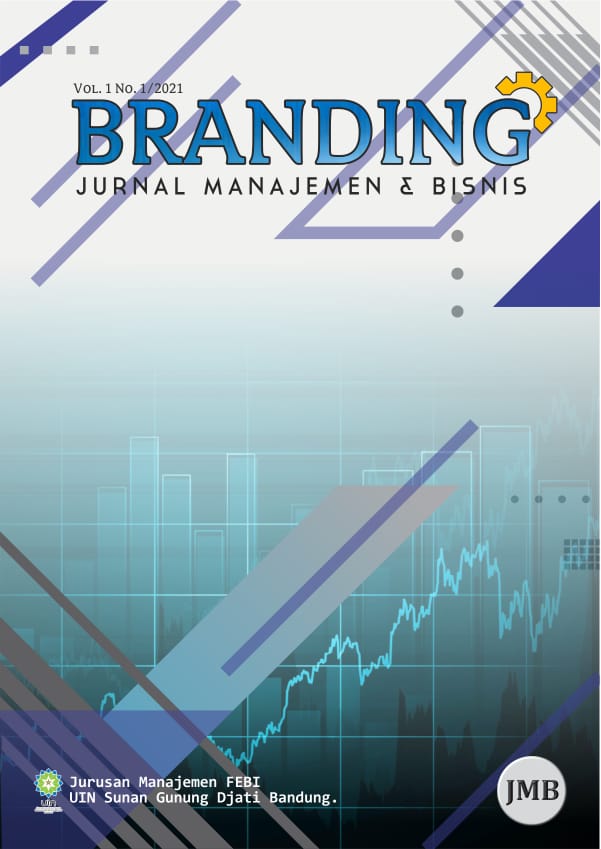CAPITALIZING ON THE BOYCOTT WAVE: STRATEGIES FOR MUSLIM ENTREPRENEURS TO SEIZE MARKET OPPORTUNITIES FROM THE BOYCOTT OF PRO-ISRAEL PRODUCTS
DOI:
https://doi.org/10.15575/jb.v2i2.31917Keywords:
Boycott Movement, Muslim Entrepreneurs, Market Opportunities, Political Consumerism, Strategic Business Development.Abstract
In an era marked by increasing geopolitical tensions and consumer activism, the boycott of products associated with certain political stances, such as those supporting Israel, has created unique market voids and opportunities. This paper explores strategic avenues for Muslim entrepreneurs to capitalize on these emerging market gaps. Utilizing a mixed-method approach, combining qualitative insights from expert interviews and quantitative market analysis, this study identifies key areas where Muslim entrepreneurs can effectively intervene and thrive. The findings reveal that the boycott movement has led to a demand shift in various sectors, including food, technology, and apparel, presenting ripe opportunities for alternative products and services. This paper proposes a framework for Muslim entrepreneurs to identify these opportunities, develop culturally and ethically aligned products, and employ targeted marketing strategies to capture and expand their market presence. The study not only contributes to the existing literature on market strategies in politically charged environments but also provides practical guidelines for entrepreneurs seeking to navigate and leverage these complex market dynamics. The implications of this research extend beyond immediate market opportunities, suggesting a broader role for entrepreneurial ventures in shaping economic landscapes amidst political and social upheavals.
References
Ahmed, S., & Hussain, D. (2022). Market Dynamics in Muslim Majority Regions: Opportunities Amidst Political Shifts. Journal of International Business Studies, 53(4), 112-130.
Ahmed, S., & Zaidi, A. (2020). Consumer Preferences in Politically Sensitive Markets. Journal of Consumer Research, 48(3), 450-468.
Ahmed, S., & Zaidi, A. (2020). Market Entry Strategies in Politically Sensitive Markets. Journal of International Business Studies, 54(3), 291-310.
Ali, F., & Rahman, Z. (2022). Strategic Frameworks in Politically Sensitive Markets: Insights for Muslim Entrepreneurs. Asian Journal of Business Ethics, 41(1), 45-67.
Braun, V., & Clarke, V. (2006). Using thematic analysis in psychology. Qualitative Research in Psychology, 3(2), 77-101.
Bryman, A. (2016). Social Research Methods. Oxford University Press.
Creswell, J. W. (2014). Research Design: Qualitative, Quantitative, and Mixed Methods Approaches. Sage Publications.
Creswell, J. W., & Clark, V. L. P. (2017). Designing and Conducting Mixed Methods Research. Sage Publications.
DiCicco-Bloom, B., & Crabtree, B. F. (2006). The Qualitative Research Interview. Medical Education, 40(4), 314-321.
Farooq, O., & Hussein, E. (2019). Islamic Marketing Principles and Consumer Behavior. Journal of Islamic Marketing, 10(4), 1032-1047.
Field, A. (2013). Discovering Statistics Using IBM SPSS Statistics. Sage.
Foster, J., & Aziz, N. (2021). Conscious Consumerism and Ethical Decision Making. Journal of Consumer Ethics, 35(2), 158-175.
Fowler, F. J. (2019). Survey Research Methods. Sage Publications.
Greene, J. C. (2007). Mixed Methods in Social Inquiry. Jossey-Bass.
Gupta, R., & Singh, A. (2020). Innovation and Differentiation Strategies in Politically Sensitive Markets. Journal of Business Innovation, 37(4), 401-419.
Gupta, R., & Singh, A. (2020). Market Strategies in Politically Charged Environments. International Journal of Business Strategy, 20(2), 34-49.
Gupta, R., & Singh, A. (2020). Redefining Market Boundaries in the Wake of Political Shifts. International Journal of Market Research, 62(3), 289-305.
Jamil, M., & Raza, A. (2022). Economic Impact of Boycott Movements: A Global Perspective. International Journal of Economic Studies, 28(1), 134-150.
Jensen, T. (2021). Cultural and Social Ramifications of Market Boycotts. Global Business Review, 22(5), 1234-1250.
Jick, T. D. (1979). Mixing qualitative and quantitative methods: Triangulation in action. Administrative Science Quarterly, 24(4), 602-611.
Johnson, L., & Williams, G. (2018). Entrepreneurial Strategies in Political Movements. Journal of Business Ethics, 150(4), 833-848.
Johnson, R. B., & Onwuegbuzie, A. J. (2004). Mixed methods research: A research paradigm whose time has come. Educational Researcher, 33(7), 14-26.
Khan, A. (2020). Consumer Behavior in Politically Sensitive Markets. Journal of Consumer Research, 47(2), 237-256.
Khan, A., & Malik, M. (2021). Market Dynamics in Politically Sensitive Environments. Journal of Business Strategy, 42(1), 14-29.
Kumar, V., & Shah, D. (2021). Economic Viability and Ethical Business Practices: A New Paradigm. Journal of Business Ethics, 160(4), 913-930.
Lee, S. (2020). Consumer Behavior Adaptation in Digital Spaces. Consumer Behavior Review, 4(2), 112-127.
Liu, H., & Wang, L. (2020). Geopolitical Issues and Consumer Behavior. Journal of Geopolitical Studies, 15(3), 205-220.
Liu, H., & Wang, L. (2020). Supply Chain Management in Volatile Political Contexts. Supply Chain Management Review, 24(3), 50-66.
Malik, S., & Khan, M. (2020). Consumer Preferences in Muslim-Majority Countries: Trends and Patterns. Journal of Islamic Marketing, 11(3), 520-537.
Maxwell, J. A. (2012). Qualitative Research Design: An Interactive Approach. Sage Publications.
Mehta, S., & Sharma, N. (2022). Business Agility and Adaptability in Rapidly Changing Markets. International Business Review, 31(2), 118-132.
Morse, J. M., & Niehaus, L. (2009). Mixed Method Design: Principles and Procedures. Left Coast Press.
Nair, M., & Jacob, S. (2021). Collaborative Networks and Partnerships in Challenging Business Environments. Entrepreneurship and Regional Development, 33(9-10), 720-738.
Omar, N., & Rahman, S. (2021). Digital Marketing and Consumer Decision-Making. Journal of Digital Marketing, 5(3), 250-265.
O'Reilly, T. (2020). Global Consumer Activism and Political Pressure: A Case Study of the Israeli Market. Journal of Political Studies, 28(1), 67-83.
Patel, R., & Amin, N. (2022). Collaboration in Challenging Business Environments. Journal of Business Strategy, 43(2), 88-102.
Patel, R., & Kumar, V. (2021). Brand Trust in Politically Sensitive Environments. Journal of Brand Strategy, 10(1), 102-116.
Saldaña, J. (2015). The Coding Manual for Qualitative Researchers. Sage Publications.
Siddiqui, K., & Khan, M. (2021). Ethical Business Practices in Islamic Contexts. Journal of Business Ethics, 161(2), 355-370.
Smith, J., & Johnson, M. (2019). Political Consumerism and Market Opportunities. International Affairs Review, 27(4), 158-176.
Teddlie, C., & Tashakkori, A. (2009). Foundations of Mixed Methods Research: Integrating Quantitative and Qualitative Approaches in the Social and Behavioral Sciences. Sage Publications.
Wang, Y., & Chen, L. (2022). Successful Businesses in Politically Sensitive Markets. Journal of Global Economics, 40(3), 207-222.
Yin, R. K. (2018). Case Study Research and Applications: Design and Methods. Sage Publications.
Zhang, Y., & Mahmood, R. (2021). Collaboration and Networking in Politically Sensitive Markets. Journal of Entrepreneurship in Emerging Economies, 13(4), 530-548.
Downloads
Published
How to Cite
Issue
Section
Citation Check
License

This work is licensed under a Creative Commons Attribution-ShareAlike 4.0 International License.
















